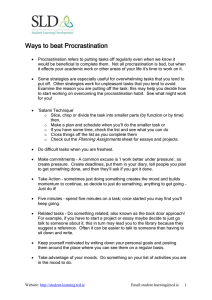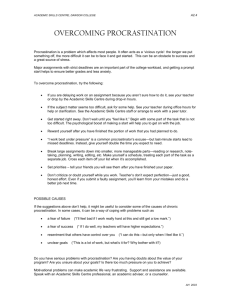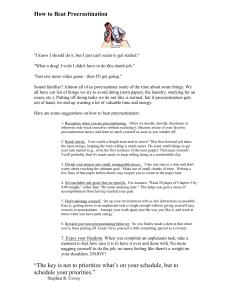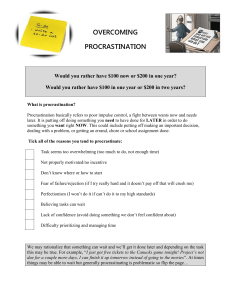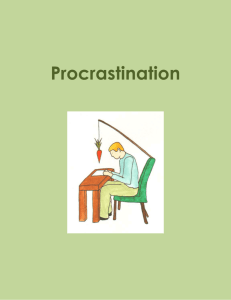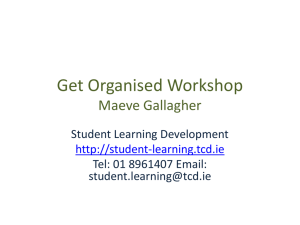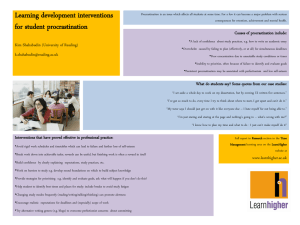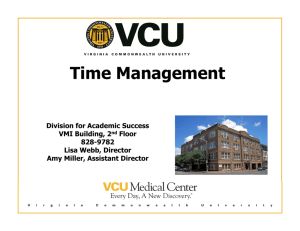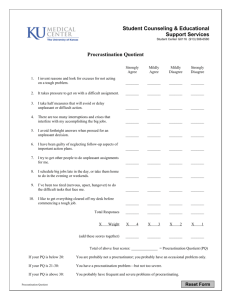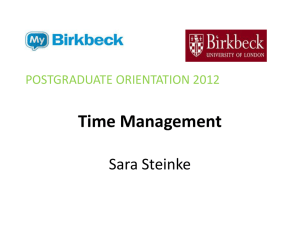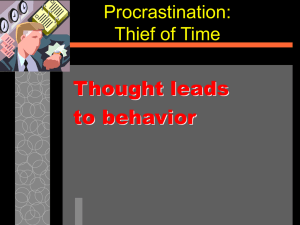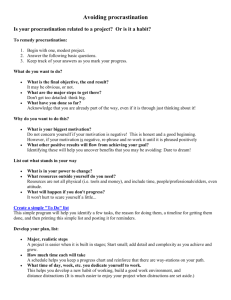Get-Organised-Time Management
advertisement
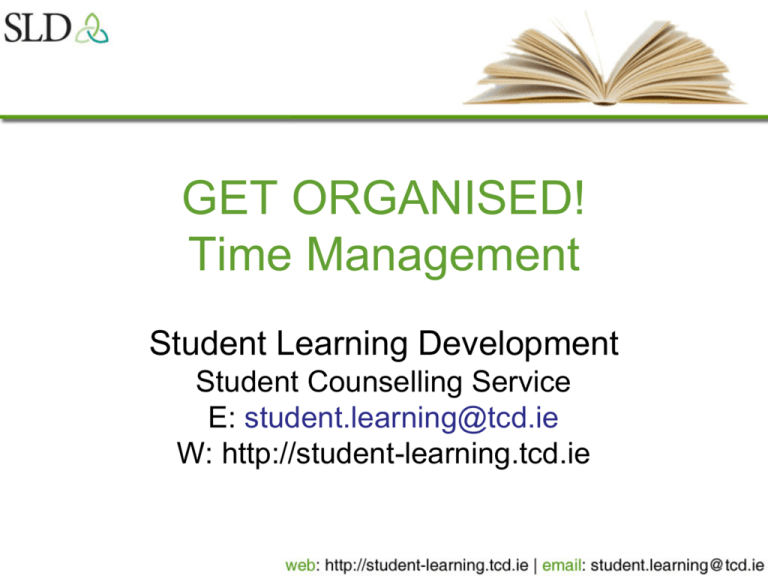
GET ORGANISED! Time Management Student Learning Development Student Counselling Service E: student.learning@tcd.ie W: http://student-learning.tcd.ie Learning Objectives • Become aware of importance of selfmanagement • Learn about goal setting, time management and procrastination • Controlling distractions and overcoming procrastination • Practice strategies Self-Management Effectively managing yourself and your resources by: • Planning • Monitoring • Evaluating Self-Assessment • What study goals have you done this week? • If you didn’t achieve them why not? • What do you hope to do the rest of the week? • What have you done to get organised? Environment Routine Notes Mind Goal Setting • Goals help us focus, stay in control • Goals are motivating • Different types: – Long term goals – Medium term goals – Short term goals SMART Goal Setting • S = Specific • M = Measurable • A = Action • R = Realistic • T = Time-based EXERCISE Discuss the various techniques or things you do to help manage your time and resources • What works? • What doesn’t work? Time Management Strategies • Prioritise your tasks • How? Setting Priorities High Urgency Low Urgency High Importance 1 Do it now 2 Plan to do it Low Importance 3 4 Resist giving it high Time Wasters priority Busy work Time Management Strategies • • • • • • • Prioritise Specificity Small bite-size pieces Use all available time Structure the environment Establish a routine Scheduling Scheduling – use a system • Diary and/or • Term Planner • Time Tables • To do lists – weekly or daily • Relaxation time • Monitor, evaluate, reward Get a diary • Everything • Check daily • Dates, meetings, lectures, timetable • Social / Relaxation • Rewards www.printfree.com Plan Weekly – short term tasks An example timetable Before 9.00 9.00-11.00 11.00-13.00 14.00-15.00 15.00-17.00 After 19.00 Lecture: Myth 10-11 PB 101 Work in library 11-12 Lecture: Rome 12-1 HUM44 Keep free Seminar: Myth 3-4 URS21 Independent study Independent study Independent study Seminar: Rome 9-10 HUM15 Independent study 10-11 Independent study Badminton 2-3 Badminton 3-4 (Union night) Independent study Independent study Lecture: Myth 2-3 PB101 Work in library 3-4 Lecture: Rome 4-5 HUM44 Film soc Fri Lecture: Epic 9-10 PB 105 Seminar: Epic 10-11 URS21 Independent study Independent study (Out with friends) Sat Paid work Paid work Paid work (Out with friends) Independent study Make to-do list for next week Mon Tues Swim Wed Thurs Sun Swim Lecture: Epic 4-5 PB105 Paid work Lists “The best thing I did was to make lists of things that I needed to do and prioritize them. It helped me to become more organized and efficient. It really helps me to keep on top of things and also not to procrastinate. Procrastination is the easiest thing to do and the hardest thing to get away from.” Joanna To-do list • Make a list of all tasks • If it can be done in 2 mins do it now • If not, add it to your list • Prioritise Options: www.rememberthemilk.com Mobile Phone Notepad Diary www.mindtools.com Distractions • • • • • • • • • Emails Phone calls & texts Facebook/Twitter/Bebo Surfing the net Computer games Television Food & Drink Tidying/Housework Family commitments PROCRASTINATION Is to delay needlessly something that we believe would be to our benefit! Patterns of Procrastination • Perfectionist – Focused on excellence at the expense of getting tasks completed on time. (Focused on the future) • Postponer – Focused on having fun and avoiding difficult tasks. (Focused on the immediate present) • Politician – Focused on social commitments and others needs – can’t say no. (Focused on externals) • Punisher – Focused on own perceived shortcomings and failures. (Focused on the past) Patterns of Procrastination (Schubert Walker, 2004 in Counseling the Procrastinator in Academic Settings) Overcoming Procrastination • Take Action • Worst first • Salami Technique • Make Commitments • Five Minutes • Related Tasks Organise your learning • PURPOSE • STRATEGY • REVIEW Making sense of the mess! Setting up a filing system • Make it simple – if it’s complicated, you won’t use it • Aim to be able to file it quickly and find it quickly • Use box files or magazine holders to store documents, notes, small books etc – label clearly • Use document folders to transport what you need each day - empty and repack these regularly! Organise your mind! • • • • Positive attitude Positive language Self-efficacy Goals and wants Some work for you Stop doing Continue doing Start doing Signed ----------------------------------------------- Date:---------------------------------- Summary • Plan, monitor and evaluate how you manage yourself and your time • Set and achieve SMART goals • Use a time management system and effective strategies • Get things started and finished – beat procrastination • Maintain balance Further information • W: http://student-learning.tcd.ie • P: 896-1407 • E: student.learning@tcd.ie
